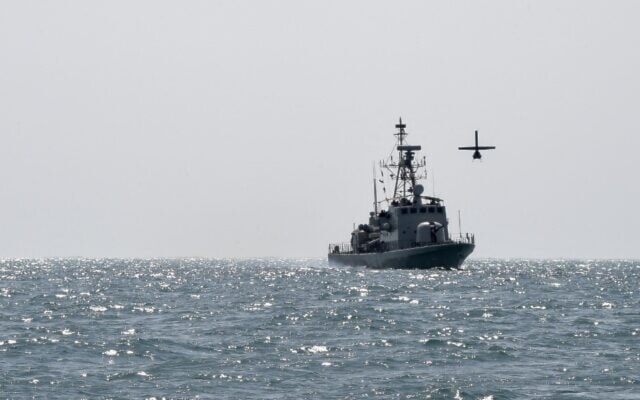Yemeni missiles, drones can hit fleet in 75 seconds: 5th Fleet Cmdr.
The Commander of the US Fifth Fleet, Charles Bradford Cooper, affirms that there has never been an instance of targeting commercial ships or US Navy vessels with ballistic missiles.
-

Illustrative: A US Navy Martin UAV drone flies over the Gulf waters as the Royal Bahrain Naval Force (RBNF) Abdulrahman Al Fadhel takes part in a joint naval exercise between the US 5th Fleet Command and Bahraini forces, on October 26, 2021. (AFP)
The Commander of the US Fifth Fleet, Charles Bradford Cooper, highlighted, on Monday, that once Ansar Allah's missiles and drones are launched, they could reach their target in the Red Sea within 75 seconds. In response, US forces have only a brief window of 9 to 15 seconds to decide and take action to intercept and shoot down a missile or drone launched by Ansar Allah, as per Cooper.
Cooper affirmed, during an interview for the US CBS, that there has never been an instance of targeting commercial ships or US Navy vessels with ballistic missiles before, in reference to one of the operations by the Yemeni Armed Forces whereby they targeted a US warship with a number of ballistic missiles.
The U.S. Fifth Fleet and Naval Forces Command Center safeguard American interests in Middle East waters, including the Red Sea, where Iran-backed Houthi terrorists continue to target commercial vessels and U.S. Navy warships. @NorahODonnell was granted rare access to the site in… pic.twitter.com/zGR1qevL0I
— CBS Evening News (@CBSEveningNews) January 30, 2024
Elsewhere in his remarks, Cooper alleged that Iran provides Ansar Allah in Yemen with intelligence information to target the US military.
It is worth noting that the US Fifth Fleet, part of the Navy, is stationed in the waters opposite Bahrain.
This comes shortly after the spokesperson of the Yemeni Armed Forces Brigadier General Yahya Saree announced that Yemen targeted US Navy warship Lewis B Puller sailing through the Gulf of Aden.
Saree specified that the warship was involved in providing logistical support for the US forces waging aggression against Yemen, among other missions.
"The operation is part of the military measures taken by the Yemeni Armed Forces in defense of the Yemeni people and as part of the commitment to support the oppressed Palestinian people," Saree added.
Concluding his statement, Saree reaffirmed the YAF's commitment to enforce a blockade on Israeli navigation in the Red Sea until a ceasefire is achieved in Gaza and the siege enforced on the people of Gaza is lifted.
Yemen’s Ansar Allah educates US Pentagon militarily: NYT
In the same context, a piece by The New York Times has lately affirmed that the resourceful Ansar Allah proved adept at troubling American allies in the Middle East to the extent that Pentagon strategists began emulating some of their tactics.
Highlighting Ansar Allah's success in repurposing readily available commercial radar systems from boating stores and enhancing their portability, a senior US commander tasked Marines with devising a comparable solution. By September 2022, Marines in the Baltic Sea were implementing mobile radar systems inspired by the ingenuity of Ansar Allah.
Senior Pentagon officials recognized early on, with the onset of Ansar Allah operations in the Red Sea, that bringing them under control would pose a significant challenge, as per the report.
It is a challenging undertaking, further complicated by the fact that Ansar Allah has mastered the strategies of unconventional warfare, as per statements from American military officials. The Resistance movement lacks significant large weapons storage facilities that American fighter jets could target, given that its fighters are consistently mobile, launching missiles from pickup trucks on secluded beaches before swiftly relocating.
This raises the question of the possible impact, if any, of what the US designates as "successful" attacks in Yemen.
British warships lack 'necessary capabilities' to hit Yemenis: Reports
Meanwhile, according to The Telegraph, the British naval ships dispatched to the Red Sea are not armed with missiles capable of attacking land targets in Yemen, a British defense source revealed.
At the end of November, the British government announced that it dispatched the Royal Navy ship HMS Diamond under the pretext of "reinforcing regional security" in the Gulf and the Indian Ocean.
According to the source, the Diamond destroyer stationed in the Red Sea did not strike the Yemeni Armed Forces (YAF)' s land targets because it lacked the necessary capabilities.
The Telegraph detailed that the British navy's only ground attack weapons were artillery cannons situated at the front of each warship. While US ships employ Tomahawk cruise missiles, the UK's sole choices are supposedly planes stationed 1,500 miles distant or submarines.
Former UK Deputy Defense Minister Mark Francois was quoted saying that the British navy's lack of firepower was referenced in a defense committee report years ago, and capable missiles are still not operational.
Freedom of navigation
As companies rerouted their ships from crossing the Red Sea to using the Cape of Good Hope, it is worth noting that the Yemeni Armed Forces have stressed repeatedly that all ships are free and safe to make their trips as long as they are not involved in the ban. The ban includes Israeli ships, Israeli-affiliated ships, and ships heading to ports in occupied Palestine.
On that note, earlier in January, the Deputy Foreign Minister of Sanaa, Hussein al-Ezzi, responded to what he referred to as "false and misleading" narratives promoted by the US, Britain, and Germany, regarding the security of navigation in the Red Sea.
Al-Ezzi expressed that Yemen reaffirms the safety and security of navigation for all destinations except the ports of Israeli-occupied Palestine. He stressed that Sanaa aims through this limited, temporary measure to "lift the brutal siege imposed on the residents of Gaza," calling it a humanitarian duty.
Read more: China: US-UK attacks on Yemen escalate tensions, threaten ship safety

 5 Min Read
5 Min Read








